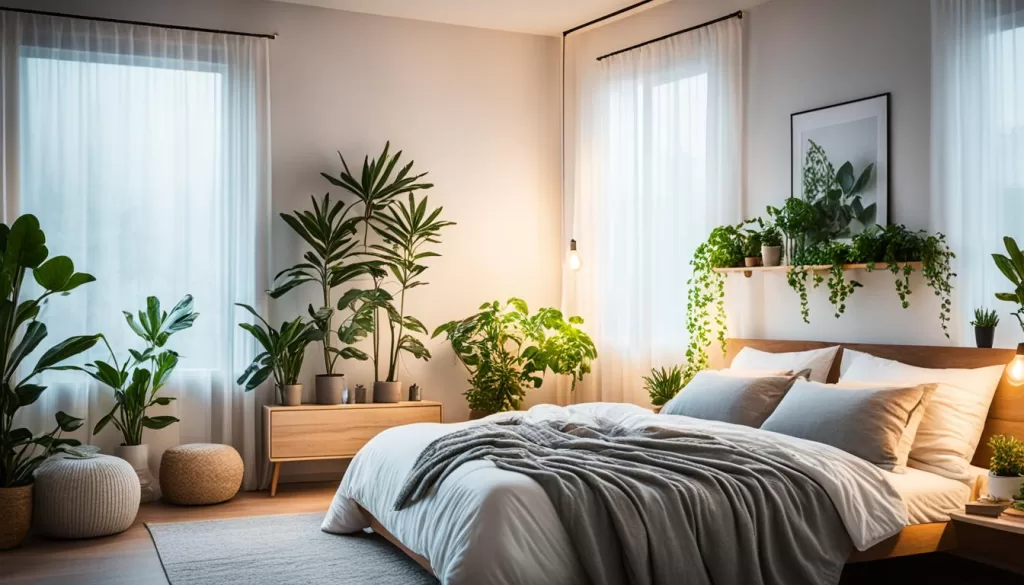Conquer Insomnia Naturally: Sleep Hygiene Hacks is your go-to resource for tackling common sleep challenges such as insomnia and early waking. Did you know that approximately 30% of adults experience insomnia, while 10% suffer from early waking? In this comprehensive guide, unlock practical strategies to combat these issues and bid farewell to restless nights.
By exploring tips on sleep hygiene and natural aids, you can welcome rejuvenating sleep and improve the quality of your rest. Say goodbye to tossing and turning, and hello to a peaceful slumber.
Key Takeaways:
- Discover strategies to overcome insomnia naturally
- Learn about the importance of sleep hygiene for better sleep
- Explore natural remedies to promote restful sleep
- Implement practical tips for creating a sleep-inducing environment
- Find relief from insomnia by managing stress effectively
Understanding Insomnia: Causes and Symptoms
Insomnia is a common sleep disorder that affects millions of people worldwide. Understanding the causes and symptoms of insomnia is the first step towards finding effective sleep disorder treatment and learning how to stop insomnia from disrupting your life.
Causes of Insomnia
Insomnia can be caused by a variety of factors, including:
- Stress and anxiety
- Depression
- Chronic pain
- Medical conditions like sleep apnea
- Side effects of certain medications
- Unhealthy sleep habits
Identifying the underlying cause of your insomnia is crucial in determining the appropriate sleep disorder treatment. Consulting with a healthcare professional can help pinpoint the root cause and guide you toward effective solutions.
How to overcome insomnia
Symptoms of Insomnia
Recognizing the symptoms of insomnia can help you seek timely sleep disorder treatment. Common symptoms include:
- Difficulty falling asleep
- Waking up frequently during the night
- Feeling tired or groggy upon waking
- Daytime fatigue
- Irritability and mood disturbances
If you are experiencing any of these symptoms regularly, it’s important to address them proactively to prevent the negative impact they can have on your overall well-being.
Insomnia can significantly affect a person’s quality of life, leading to decreased productivity, impaired cognitive function, and increased risk of accidents. Seeking effective sleep disorder treatment is essential in maintaining optimal health and well-being.
By understanding the causes and symptoms of insomnia, you can take proactive steps towards sleep restoration. From implementing healthy sleep habits to exploring natural remedies, there are various approaches to finding relief from insomnia and improving the quality of your sleep.
For more information on sleep disorder treatment and how to stop insomnia, continue reading our comprehensive guide. Sleep Solutions is your go-to resource for conquering the challenges of sleep disorders and achieving rejuvenating sleep.
Creating a Sleep-Inducing Environment: The Power of Sleep Hygiene
Creating a conducive sleep environment is essential for improving your sleep quality and developing healthy sleep habits. By implementing proper sleep hygiene practices, you can optimize your surroundings to promote restful sleep.
Here are some tips for sleep hygiene that will help you create the perfect environment for a good night’s sleep:
- Keep your bedroom cool, dark, and quiet: Maintain a comfortable temperature in your bedroom to ensure a peaceful sleep. Use blackout curtains or an eye mask to block out any unwanted light. Reduce noise by using earplugs or a white noise machine.
- Establish a consistent sleep schedule: Go to bed and wake up at the same time every day, even on weekends. This helps regulate your body’s internal clock and enhances your sleep quality.
- Create a soothing bedtime routine: Engage in relaxing activities before bed, such as reading a book, taking a warm bath, or practicing gentle stretching. This signals to your body that it’s time to wind down and prepares you for a restful sleep.
- Avoid electronic devices before bed: The blue light emitted by screens can disrupt your sleep. Try to limit your exposure to electronic devices, such as smartphones, tablets, and laptops, at least an hour before bedtime.
- Ensure a comfortable sleep environment: Invest in a supportive mattress, pillows, and bedding that suit your individual preferences. Experiment with different sleep positions and find the one that provides optimal comfort for you.
By incorporating these healthy sleep habits into your routine and maintaining a sleep-inducing environment, you can significantly improve your sleep quality and overall well-being.
“A peaceful sleep environment is the foundation of a good night’s rest. Implementing sleep hygiene tips helps create the ideal conditions for restorative sleep.”
Prioritizing Sleep Hygiene for Optimal Health
Sleep hygiene plays a crucial role in maintaining your physical and mental well-being. It not only enhances your sleep quality but also improves your daytime functioning, concentration, and overall productivity.
Developing healthy sleep habits takes time and consistency. By prioritizing sleep hygiene, you can experience the following benefits:
- Reduced risk of chronic health conditions like obesity, diabetes, and cardiovascular diseases
- Improved immune function and better ability to fight off infections
- Enhanced cognitive abilities, memory, and learning capacity
- Increase in energy levels and overall mood
Remember, improving your sleep quality is an ongoing process. By incorporating these sleep hygiene tips into your daily routine, you can establish a healthy sleep environment that allows you to wake up each morning feeling refreshed and revitalized.
Natural Remedies for Insomnia: A Holistic Approach
Welcome to Sleep Solutions, your go-to resource for tackling common sleep challenges such as insomnia and early waking. In this section, we will explore a holistic approach to finding relief from insomnia through natural remedies. Discover how herbal supplements, relaxation techniques, and other complementary therapies can promote restful sleep and enhance your overall well-being.
Herbal Supplements for Insomnia Relief
Herbal remedies have a long history of use in promoting sleep and easing insomnia. Consider incorporating these natural options into your bedtime routine:
- Valerian root: Valerian root is a popular herbal supplement known for its calming effect and ability to improve sleep quality. It can be consumed as a tea or taken in capsule form.
- Chamomile: Chamomile tea is a soothing and gentle remedy that can help promote relaxation and alleviate sleeplessness. Sip on a warm cup of chamomile tea before bed to enjoy its tranquilizing effects.
- Lavender: Lavender essential oil has been used for centuries to promote sleep. Add a few drops to a diffuser or sprinkle it on your pillow to experience its calming aroma.
Relaxation Techniques for Improved Sleep
Practicing relaxation techniques can significantly contribute to a good night’s sleep. Consider incorporating these methods to promote relaxation:
- Deep breathing exercises: Deep breathing helps slow down your heart rate and relax your body. Take slow and deep breaths, filling your belly and exhaling slowly.
- Progressive muscle relaxation: This technique involves tensing and relaxing different muscle groups to release tension and promote overall relaxation. Start from your toes and work your way up to your head, consciously relaxing each muscle group.
- Guided imagery: Visualize a calming and peaceful scene that makes you feel relaxed and serene. Focus on the details and immerse yourself in this mental escape.
Complementary Therapies for Restful Sleep
Explore these complementary therapies to enhance your sleep quality and find relief from insomnia:
- Aromatherapy: Essential oils, such as lavender and chamomile, can be used during massage or added to a warm bath to promote relaxation and restful sleep.
- Acupuncture: This ancient Chinese practice involves inserting thin needles into specific points on the body. Acupuncture has been reported to improve sleep quality and ease insomnia symptoms.
- Yoga and meditation: Engaging in gentle yoga poses and mindfulness meditation can help calm the mind and relax the body for better sleep. Incorporate these practices into your daily routine for maximum benefits.
Remember, everyone’s response to natural remedies may vary. It’s best to consult with a healthcare professional before starting any new supplements or therapies, especially if you are taking other medications or have an underlying health condition.
How to overcome insomnia
By embracing natural remedies for insomnia and adopting a holistic approach, you can improve your sleep quality and find relief from sleepless nights. Say goodbye to restless nights and embrace rejuvenating sleep with the power of complementary therapies.
| Natural Remedies for Insomnia | Benefits |
|---|---|
| Valerian root | Promotes relaxation and improves sleep quality |
| Chamomile | Soothes and calms the mind, helping to alleviate sleeplessness |
| Lavender | Produces a calming effect and aids in achieving restful sleep |
| Deep breathing exercises | Slows down heart rate and induces relaxation |
| Progressive muscle relaxation | Relieves tension and promotes overall relaxation |
| Guided imagery | Creates a mental escape for a tranquil state of mind |
| Aromatherapy | Utilizes the calming effects of essential oils for relaxation |
| Acupuncture | Improves sleep quality and alleviates insomnia symptoms |
| Yoga and meditation | Calms the mind and relaxes the body for better sleep |
Stress Management for Better Sleep: Techniques to Relax the Mind
Welcome to “Sleep Solutions” – your go-to resource for tackling common sleep challenges such as insomnia and early waking. In this section, I’ll share effective stress management techniques that can help relax your mind and promote better sleep. Along with that, we’ll explore home remedies for insomnia and practical ways to reduce stress for a restful night’s sleep.
Relaxation Techniques for Improved Sleep
If stress and anxiety are keeping you awake at night, learning relaxation techniques can significantly benefit your sleep. Deep breathing exercises and progressive muscle relaxation are effective ways to calm your mind and release tension from your body. By focusing on your breath and gradually relaxing each muscle group, you can achieve a state of calm that prepares you for a peaceful sleep.
A meditation or yoga practice before bed can also help alleviate stress and induce sleep. These mindfulness-based activities provide an opportunity to quiet your mind, let go of racing thoughts, and enter a state of serenity that promotes better sleep.
How to overcome insomnia
The Power of Aromatherapy
Aromatherapy is a natural and soothing way to ease stress and promote relaxation before bedtime. Consider incorporating essential oils like lavender, chamomile, or bergamot into your nighttime routine. You can use them in a diffuser, mix a few drops into a carrier oil for a relaxing massage, or create a homemade linen spray to spritz on your pillow.
“Aromatherapy allows you to tap into the calming and therapeutic effects of pleasant scents, promoting a sense of tranquility that encourages a restful night’s sleep.” – Sleep Solutions
Creating a Restful Environment
Your sleeping environment plays a crucial role in promoting relaxation and better sleep. Make sure your bedroom is cool, dark, and quiet. Consider investing in blackout curtains, earplugs, or a white noise machine to eliminate external disturbances. Sensory elements like soft bedding, cozy pillows, and a comfortable mattress can also contribute to a soothing sleep environment.
Home Remedies for Insomnia
In addition to relaxation techniques, you can try several home remedies to alleviate insomnia and promote better sleep. Some options include:
- Drinking a cup of herbal tea before bed, such as chamomile or valerian root
- Taking a warm bath or shower to relax both your mind and body
- Practicing a bedtime routine that signals to your brain it’s time for sleep
- Avoiding caffeine, alcohol, and heavy meals close to bedtime
It’s important to note that the effectiveness of home remedies may vary from person to person. If you have chronic insomnia or your sleep troubles persist, it’s advisable to consult a healthcare professional for further guidance.
Implementing stress management techniques and incorporating home remedies for insomnia can have a significant impact on your ability to achieve quality sleep. By creating a peaceful environment, practicing relaxation techniques, and utilizing natural remedies, you can find relief from stress-induced sleep disturbances and enjoy restful nights that leave you refreshed and rejuvenated.
How to overcome insomnia
Sleep Positions: Finding Your Optimal Sleeping Posture
When it comes to getting a restful night’s sleep, finding the right sleep position is crucial. The position you sleep in can greatly impact your comfort and overall sleep quality. Let’s explore different sleep positions and discover the optimal sleeping postures for specific conditions.
Best Sleeping Positions
1. Back Sleeping: Sleeping on your back with a pillow to support your neck and a small pillow under your knees can help align your spine and reduce the risk of lower back pain and sciatica.
2. Side Sleeping: Sleeping on your side, particularly with a pillow between your legs, is a great option for pregnant women as it helps alleviate pressure on the back and improves circulation. Additionally, side sleeping can also be beneficial for those with lower back pain or sciatica.
3. Stomach Sleeping: While stomach sleeping may not be the best option for most people, it can offer relief for those with sleep apnea or snoring. If you prefer to sleep on your stomach, place a flat pillow under your hips to reduce strain on your neck and lower back.
How to overcome insomnia
Optimal Sleep Postures for Specific Conditions
1. Pregnancy: As your body goes through changes during pregnancy, finding a comfortable sleep position can be challenging. Sleeping on your side, particularly the left side, improves blood flow to the fetus and reduces the risk of complications.
2. Lower Back Pain: If you experience lower back pain, try sleeping on your side with a pillow between your legs to align your spine. Alternatively, you can also sleep on your back with a pillow under your knees to relieve pressure on your lower back.
3. Sciatica: To alleviate pain caused by sciatica, it’s recommended to sleep on your side with a pillow between your legs. This position helps reduce pressure on the sciatic nerve and promotes spinal alignment.
Discover Your Optimal Sleep Position for a Good Night’s Rest
Everyone has unique comfort preferences, and it may take some trial and error to find your optimal sleep position. Experiment with different positions and observe how your body feels in each one. Pay attention to any aches, pains, or discomfort and make adjustments accordingly.
Remember, maintaining proper sleep posture is essential for a comfortable and pain-free night’s sleep. Consult with your healthcare provider if you have specific concerns or conditions that may require specialized sleep positions.
How to overcome insomnia
Conclusion
In conclusion, by implementing the tips and strategies shared in this article, you can overcome insomnia, improve your sleep quality, and experience rejuvenating and restful sleep. Sleep solutions are within reach, and with a holistic approach, you can conquer insomnia naturally.
With a focus on sleep hygiene, creating a sleep-inducing environment, and utilizing natural remedies, you can enhance the quality of your sleep. Incorporating stress management techniques and finding the optimal sleeping position further contribute to a restful night’s sleep.
Say goodbye to restless nights and hello to rejuvenating sleep with the help of Sleep Solutions. Our comprehensive guide provides practical solutions for common sleep challenges, ensuring that you wake up feeling refreshed and revitalized. Sweet dreams await!
How to overcome insomnia


